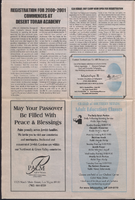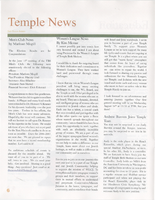Search the Special Collections and Archives Portal
Search Results
Robin and Danny Greenspun oral history interview
Identifier
Abstract
Oral history interview with Robin and Danny Greenspun conducted by Michael Geeser on June 28, 1995 for the I Remember When: Recollections from Las Vegas Jewish Leaders oral history project. The Greenspuns discuss their different childhood experiences growing up Jewish in Las Vegas, Nevada. Robin and Danny each discuss their family histories briefly. They also discuss their philanthropy, specifically the CineVegas film festival. Finally, they discuss how they feel the Jewish community in Las Vegas is at the time of the interview, and how the next generation will grow and change the city.
Archival Collection
Shelley Berkley oral history interview
Identifier
Abstract
Oral history interview with Shelley Berkley conducted by Michael Geeser on January 9, 2006 for the I Remember When: Recollections from Las Vegas Jewish Leaders Oral History Project. Berkley talks about her career as a Jewish woman legislator, about growing up in Las Vegas, Nevada, and about issues such as Medicare, education, and Israel. She also answers questions from the audience.
Archival Collection
Justice Michael Cherry oral history interview
Identifier
Abstract
Oral history interview with Nevada Supreme Court Justice Michael Cherry conducted by Michael Geeser on April 10, 2006 for the I Remember When: Recollections from Las Vegas Jewish Leaders Oral History Project. Cherry talks about his legal career, and about being Jewish in Las Vegas. He also discusses his board membership at Temple Beth Sholom and serving as president of Temple Ner Tamid, as well as his activities in B'nai B'rith District 4. The interview concludes with questions from the audience.
Archival Collection
Burton Cohen oral history interview
Identifier
Abstract
Oral history interview with Burton Cohen conducted by Michael Geeser on November 14, 2005 for the I Remember When: Recollections from Las Vegas Jewish Leaders Oral History Project. He talks about his career as a casino executive, celebrities in Las Vegas, Nevada, the role of organized crime in the city, and about executives of other casinos. He also answers questions from the audience.
Archival Collection

Michael Green oral history interview: transcript
Date
Archival Collection
Description
Oral history interviews with Michael Green conducted by Barbara Tabach on February 26, 2018 and April 04, 2018 for the Southern Nevada Jewish Heritage Project. In the first interview, Green discusses his family background and growing up in Las Vegas, Nevada. He talks about his Jewish ancestry and the significance of religious communities in Las Vegas. In the second interview, Green discusses the growth of the Jewish community in Las Vegas, and the history of the Jewish heritage in Southern Nevada.
Text

Angela Castro oral history interview: transcript
Date
Archival Collection
Description
Oral history interview with Angela Castro conducted by Stefani Evans, Cecilia Winchell, Kristel Peralta, Vanessa Concepcion, and Ayrton Yamaguchi on November 05, 2020 for the Reflections: The Las Vegas Asian American and Pacific Islander Oral History Project. Castro begins the interview by talking about her early life, childhood, what Guam was like, and the history of her parents and grandparents. She describes the difference in public and private education in Guam and compares it to the United States. She explains the reason why she moved to Las Vegas, Nevada in 1998 and attended the University of Nevada, Las Vegas for public relations. Castro then talks about the differences between older and newer generations, the political atmosphere in Guam, and the differences between the United States and Guam in politics. She also talks about the discrimination she has experienced throughout her life and diversity in the workplace. Lastly, she describes her culture and traditions during holidays, the struggles with an absence of culture within her family, and her personal religious beliefs.
Text




